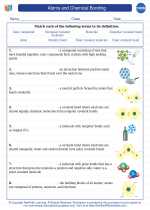Products in Chemistry
In chemistry, the term "products" refers to the substances that are formed as a result of a chemical reaction. When two or more reactants combine, they undergo a rearrangement of atoms and bonds to form one or more new substances, which are the products of the reaction.
Types of Products
There are several types of products that can be formed in a chemical reaction:
- Single Product: A reaction may produce a single product, such as in the combustion of methane:
- Multiple Products: Some reactions result in the formation of multiple products, as in the decomposition of water:
- Stoichiometric Products: These are the products formed in the exact ratio predicted by the balanced chemical equation.
- Limiting and Excess Products: In reactions where one reactant is present in excess, the product formed is the limiting product. The reactant that is not fully consumed is the excess reactant, and it may produce an excess product.
CH4 + 2O2 → CO2 + 2H2O
2H2O → 2H2 + O2
Calculating Products
It is possible to calculate the amount of product formed in a chemical reaction using stoichiometry. This involves using the balanced chemical equation and the molar masses of the reactants and products to determine the theoretical yield of the product.
The theoretical yield is the maximum amount of product that can be formed from a given amount of reactant. In reality, the actual yield may be less than the theoretical yield due to factors such as incomplete reactions, side reactions, or loss of product during isolation.
Study Guide for Products in Chemistry
To understand the concept of products in chemistry, it is important to:
- Understand the difference between reactants and products in a chemical reaction.
- Be able to balance chemical equations to represent the formation of products.
- Learn about the different types of products that can be formed in a chemical reaction.
- Practice calculating the theoretical yield of a product using stoichiometry.
- Understand the concept of limiting and excess reactants, and how they affect the formation of products.
By mastering these concepts, you will be able to analyze and predict the products of various chemical reactions, as well as calculate the amount of product that can be obtained under different conditions.
.◂Chemistry Worksheets and Study Guides High School. Atoms and Chemical Bonding
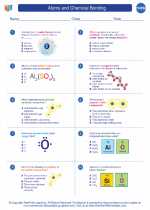
 Worksheet/Answer key
Worksheet/Answer key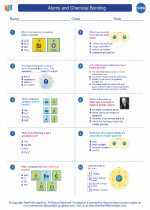
 Worksheet/Answer key
Worksheet/Answer key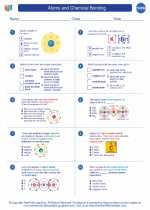
 Vocabulary/Answer key
Vocabulary/Answer key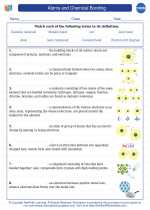
 Vocabulary/Answer key
Vocabulary/Answer key